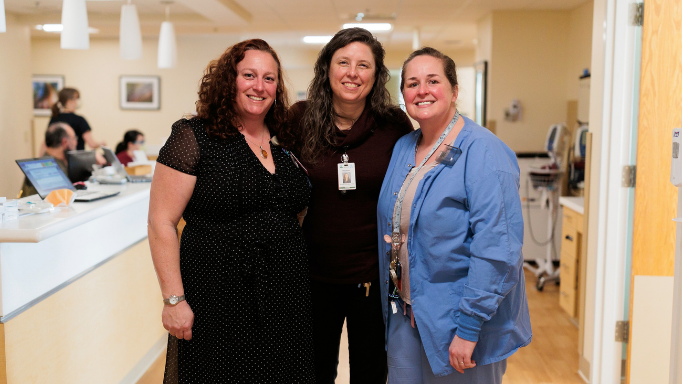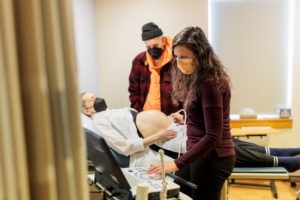
Monday, May 5 2020 is International Day of the Midwife. Gifford has a team of four midwives working at our medical center including Heather Johnston, who joined Gifford in 2017 has been a midwife for nearly 27 years and received her doctor of nursing practice from the University of Utah. In the latest episode of the Gifford Provider Podcast, Heather discusses the role of a midwife and how it has evolved over the years.
Midwife means “with women.”
With our practice at Gifford, we focus on shared decision-making with our clients and their families. Our job is to be experts in the field by knowing the current guidelines are research, but it is also to listen to our clients and understand what’s important to them. Knowing their influences and personal history and combining that with the best evidence, they’re able to feel comfortable with the decisions they make for good health. We can provide medical care. We can provide screening and advice. But health care comes from what you do in your environment and your life.
Becoming a Midwife.
I really was attracted to the more holistic kind of approach. In my opinion, birth and becoming a parent is a huge life transition. If the medical component goes awry, it can make things unpleasant and traumatizing, but this transition is more than just avoiding complications. So, I like the holistic, whole centered, family-oriented kind of approach to it. I definitely got into midwifery because I like catching babies and the pregnancy part of it, but the longer I’ve been a midwife, the more and more I love taking that same whole-person approach to primary care.
The evolution of the Midwife.
When the scientific method started developing, modern medicine began to grow out of the more traditional healer role when it became apparent that an understanding of how bodies work and some education and training were useful. Particularly in Europe midwives were very integrated into that process. However, this did not happen in the United States. In the U.S., the midwives who had good training received their experience in Europe and they were part of the immigrant population. The other main birth attendants were largely women who had been or were enslaved. Because of this, it was really easy to cut them out of the mainstream and label them as illiterate and unsafe. After World War II some nurses saw a huge need for healthcare, especially in rural communities and especially healthcare for women and children So, Maryann Breckinridge was one of the people that spearheaded rural public health and helped develop the nurse-midwife credential in the United States. Their amazing work led to a decrease in infant mortality rates, in the rural and poor communities that they served. Over the last 60 years, nurse-midwifery has evolved and expanded and become a very integrated and established part of modern healthcare.

Being a midwife does not mean we’re anti-intervention.
Sometimes there is a perception that midwives are anti-medicine because we support a lower intervention approach to birth and will support a lot of flexibility in a birth plan. Modern medicine and evidence-based care are completely compatible with the holistic approach. For example, you can have an epidural or an induction of labor without judgment. The midwifery approach is to look at the best data, the best research and the best resources we have. You put that in context of each woman’s individual need and decision-making process. I think that’s a paradigm that can be used for all aspects of health care. Just because a choice worked out for one person doesn’t mean it’s for everybody and that’s totally fine. We can have all the choices in the world, but sometimes nature gives us a path and we walk down it and make our best decisions going forward. I can provide you with the best information I have. I can provide you with the best support that I can and I can help you figure out what is best for you at this moment. Often there is more than one way to get the job done. If we have limited options or I have a strong recommendation, I will tell you. You can agree or disagree with me and then we can move forward. We will support you in your choice.
A midwife’s top priority.
Our top priority is for women to feel like they understand their options, make the choices that are best for them and will feel heard and supported. Having said that, we are human. We are not perfect. I cannot read minds and I have a very broken, foggy crystal ball. So, we do the best we can as human beings. We give guidance and help people sometimes face really hard decisions because I don’t have the power to control everything. I hope what can happen during birth is people feel they were true participants in what happened. I hope you can come out of that feeling stronger and feeling good about yourself knowing you can tackle hard things and that you can launch into parenthood from a position of strength. I think our job is to just try our best to meet people where they are and walk with them.
Midwifery isn’t just about birth, it’s about women’s health.
Years ago, when we talked about women’s health, it just meant women’s reproductive gynecologic health. But women are normal human beings who develop diabetes and depression and everything else. Understanding a woman’s stress levels, how they manage it and giving them access to resources is important. Right now, it comes down to, what you think matters and what you feel matters. You want to find somebody that will listen to you and you feel like you can work through things with them. There is no such thing as a dumb question. Most of the time, if you’ve been thinking about it, it’s pretty common. It can be freeing to just find out what’s happening when you don’t feel well or suffer from aches and pains. Just know, no matter how you need to navigate your life, we can meet you there.

